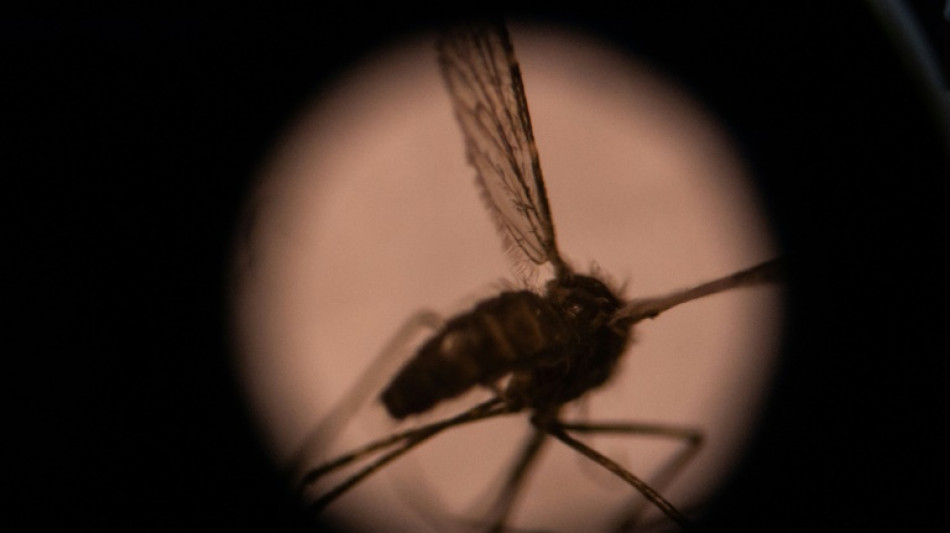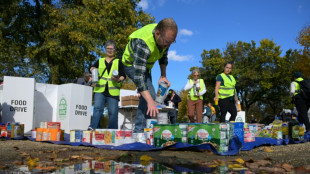
-
 Gstaad gives O'Brien record 21st Breeders' Cup win
Gstaad gives O'Brien record 21st Breeders' Cup win
-
After the tears, anger on Rio's blood-stained streets

-
 Sinner boosts number one bid in Paris, to face Zverev in semis
Sinner boosts number one bid in Paris, to face Zverev in semis
-
Springer back in Toronto lineup as Blue Jays try to close out Dodgers

-
 Nationals make Butera MLB's youngest manager since 1972
Nationals make Butera MLB's youngest manager since 1972
-
Guirassy lifts Dortmund past Augsburg ahead of Man City clash

-
 G7 says it's 'serious' about confronting China's critical mineral dominance
G7 says it's 'serious' about confronting China's critical mineral dominance
-
NFL fines Ravens $100,000 over Jackson injury status report

-
 NBA refs to start using headsets on Saturday
NBA refs to start using headsets on Saturday
-
Trump says Christians in Nigeria face 'existential threat'

-
 French-Turkish actor Tcheky Karyo dies at 72
French-Turkish actor Tcheky Karyo dies at 72
-
Food stamps, the bulwark against hunger for over 40 mn Americans

-
 Trump keeps world guessing with shock nuclear test order
Trump keeps world guessing with shock nuclear test order
-
Wall Street stocks rebound on Amazon, Apple earnings

-
 US Fed official backed rate pause because inflation 'too high'
US Fed official backed rate pause because inflation 'too high'
-
Prayers and anthems: welcome to the Trump-era Kennedy Center

-
 Swiss central bank profits boosted by gold price surge
Swiss central bank profits boosted by gold price surge
-
Sinner beats Shelton to boost number one bid in Paris

-
 French court jails Bulgarians for up to four years for Holocaust memorial defacement
French court jails Bulgarians for up to four years for Holocaust memorial defacement
-
Profits dip at ExxonMobil, Chevron on lower crude prices

-
 Ashraf and Mirza skittle South Africa as Pakistan win 2nd T20
Ashraf and Mirza skittle South Africa as Pakistan win 2nd T20
-
2,000 trucks stuck in Belarus after Lithuania closes border: association

-
 French lawmakers reject wealth tax proposal in budget debate
French lawmakers reject wealth tax proposal in budget debate
-
Premier League blames European expansion for lack of Boxing Day games

-
 Bublik sets up Auger-Aliassime semi-final at Paris Masters
Bublik sets up Auger-Aliassime semi-final at Paris Masters
-
World's most expensive coffee goes on sale in Dubai at $1,000 a cup

-
 Trump stirs global tensions, confusion with nuclear test order
Trump stirs global tensions, confusion with nuclear test order
-
Panic across US as health insurance costs set to surge

-
 Court eases ban on Russian lugers but Olympic hopes on thin ice
Court eases ban on Russian lugers but Olympic hopes on thin ice
-
England captain Itoje targets Autumn Nations clean sweep

-
 Calmer Sabalenka sets sights on WTA Finals crown
Calmer Sabalenka sets sights on WTA Finals crown
-
Spurs boosted by Romero return for Chelsea clash

-
 Sudan's RSF claims arrests as UN warns of 'horrendous' atrocities in Darfur
Sudan's RSF claims arrests as UN warns of 'horrendous' atrocities in Darfur
-
US says 'non-market' tactics needed to counter China's rare earth dominance

-
 China sends youngest astronaut, mice to space station
China sends youngest astronaut, mice to space station
-
From adored prince to outcast, Andrew's years-long fall from grace

-
 Rodri return fuels Guardiola belief in Man City title challenge
Rodri return fuels Guardiola belief in Man City title challenge
-
China holds send-off ceremony for space station astronauts

-
 Barcelona to show off unfinished Camp Nou with public training session
Barcelona to show off unfinished Camp Nou with public training session
-
Turkish court jails 11 for life over deadly hotel inferno

-
 Auger-Aliassime ends Vacherot run to reach Paris Masters semis
Auger-Aliassime ends Vacherot run to reach Paris Masters semis
-
Australia captain Wilson denies Wallabies use 'dangerous' breakdown tactics

-
 'Populists can be beaten': Dutch centrist Jetten claims election win
'Populists can be beaten': Dutch centrist Jetten claims election win
-
China's suspension of rare earth controls applies to EU: official

-
 Italy complains about strong euro, urges ECB to cut rates
Italy complains about strong euro, urges ECB to cut rates
-
Louvre to get anti-ramming barriers by year end: minister

-
 Wall Street bounces on Amazon, Apple earnings
Wall Street bounces on Amazon, Apple earnings
-
AI giants turn to massive debt to finance tech race

-
 Japan PM says raised 'serious concerns' with Xi on South China Sea, Xinjiang
Japan PM says raised 'serious concerns' with Xi on South China Sea, Xinjiang
-
Shein set to open first physical store in Paris


Malaria: Killer of African children set for vaccine zap
Hundreds of thousands of people, mostly children living in Africa, succumb every year to malaria, an age-old mosquito-borne scourge that worsened during the Covid-19 pandemic.
The World Health Organization (WHO) estimates that 627,000 people died of malaria in 2020, the latest year for which figures are available -- an increase of 12 per cent over 2019.
Ahead of World Malaria Day on Monday, AFP takes a look at this notorious disease and the excitement surrounding new vaccines.
- Half the world at risk -
Malaria is a threat to half the world's population.
Sub-Saharan Africa, Southeast Asia, the eastern Mediterranean, the Americas and areas in the Pacific such as Papua New Guinea and the Solomon Islands are all considered at risk.
- Rolling back disease -
Before 2020, the world had made steady progress on the transmission and treatment of malaria, chiefly through the use of insecticide-treated mosquito nets, testing and effective drugs.
Annual cases had fallen by 27 percent by 2017 compared with the start of the century and deaths had plunged by over 50 percent.
In June 2021, China was certified as malaria-free by the WHO, ending a long battle that began in the 1940s when the country reported 30 million cases annually.
China has gone four consecutive years without a single locally-sourced case.
- Setback -
Some 241 million cases of malaria disease were recorded worldwide in 2020, 14 million more than a year earlier, according to the WHO.
Approximately two-thirds of the additional deaths in 2020 were linked to disruption in providing malaria prevention, testing and treatment during the coronavirus pandemic.
Many patients avoided hospitals for fearing of contracting the novel virus.
- Big killer in Africa -
Sub-Saharan Africa is where 95 percent of all malaria cases and 96 percent of all deaths occur.
Half the world's cases in 2020 were reported from four African countries: Nigeria (31.9 percent of known cases), DR Congo (13.2 percent), Tanzania (4.1 percent) and Mozambique (3.8 percent).
- Very young victims -
Children under five are the most vulnerable to malaria.
In 2020, some 80 percent of the total malaria deaths on the African continent were in this age category.
- Five parasite species -
Records of the disease date back to antiquity, with symptoms including fever, headaches and muscle pain, followed by cycles of chills, fever and sweating.
Five parasite species cause malaria in humans, and all are spread through the bites of infected female mosquitoes.
The Plasmodium falciparum parasite is responsible for the most deaths.
- Treatments -
Several preventative treatments are available that help reduce the intensity of the disease and avoid deaths as well as reduce transmission.
The WHO says the best, particularly for P. falciparum malaria, is artemisinin-based combination therapy (ACT).
Preventative treatments are also strongly recommended for pregnant women and infants living in at-risk areas and travellers going to these zones. Insecticide-treated bed nets are also a cheap and effective shield.
- Vaccine buzz -
In October 2021, the WHO recommended "broad use" of the world's first malaria vaccine for children in sub-Saharan Africa after reviewing a pilot programme run in Ghana, Kenya and Malawi.
The RTS,S vaccine, which is made by the British pharmaceutical giant GlaxoSmithKline, was found to considerably reduce child mortality from the P. falciparum parasite, which is most common in Africa.
Other vaccines are on the horizon, including one developed by Britain's Oxford University, whose Matrix-M vaccine candidate became the first to surpass a WHO threshold of 75-percent efficacy.
O.Krause--BTB



